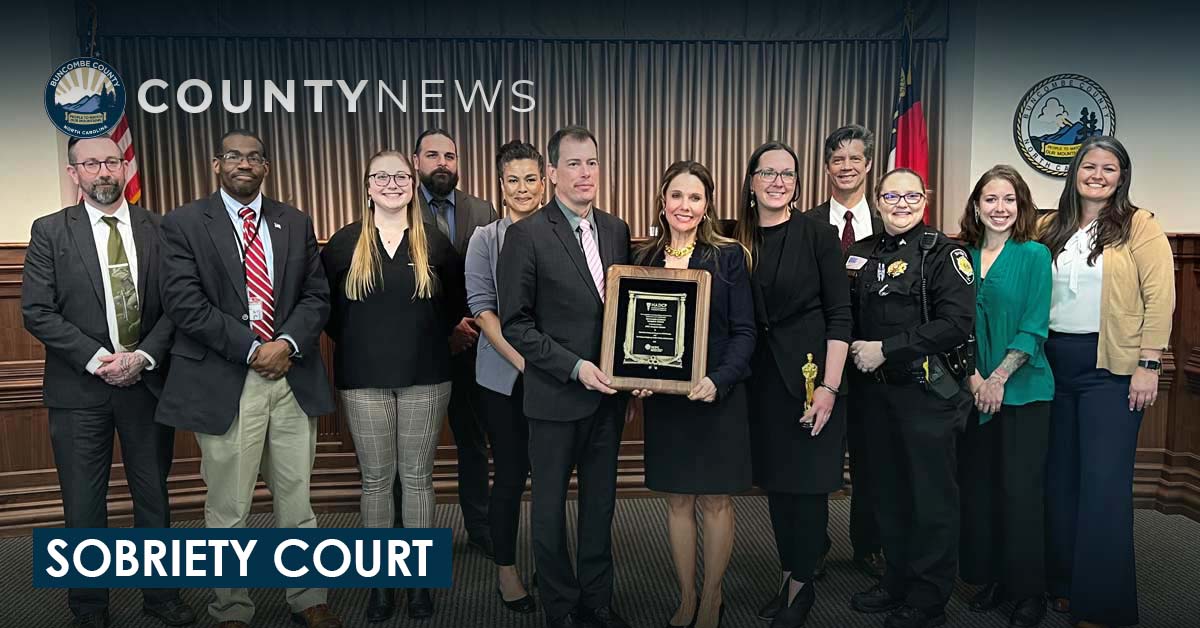This news item expired on Saturday, December 7, 2024 so the information below could be outdated or incorrect.

Did you know December is National Impaired Driving Awareness Month? To help raise awareness about this important issue, Buncombe County is sharing information about its Sobriety Court. Its primary mission is to increase public safety and save lives by reducing recidivism of persons with alcohol and drug use disorders. Sobriety Court seeks to accomplish this by facilitating substance use treatment and rehabilitation, providing increased supervision, and requiring participant accountability.
Sobriety Court strives to return individuals to the community who have addressed substance use issues and have become better equipped to maintain their sobriety, which will provide them with a better quality of life, have a positive impact, improve the community, and increase public safety.
The Buncombe County Sobriety Court is the first DWI Court in Western North Carolina. It was originally designed and implemented in February 2014 as part of the State Court system of North Carolina under the direction of the Honorable Julie M. Kepple, 28th Judicial District Court Judge. In 2017, the North Carolina Governor’s Officer of Highway Safety awarded Judge Kepple, “Partner of the Year” for the State of North Carolina.
In 2023, the County’s Sobriety Court was recognized by All Rise, formerly the National Center for DWI Courts (NCDC) as an Academy Court. NCDC's Academy Court Network identifies exemplary DWI courts to host foundational trainings, receive staff from other jurisdictions for site visits, play a significant role in participating in research and media, and serve as a national model for DWI courts. The designation honors a culmination of years of training and implementing changes and ideas from past Sobriety Court Teams over the past nine years to develop policies and procedures that adhere to the National Association of Drug Court Professionals (NADCP) Best Practice Standards for Treatment Courts.
Want to learn more about Buncombe County Sobriety Court?
Our Court works on referrals from the community. If you would like to learn more about the Buncombe County Sobriety Court, please visit:
Treatment Courts of Buncombe County | Asheville, NC
Or reach out to our Sobriety Court Coordinator, Tiffany Graaff at tiffany.graaff@buncombecounty.org or (828) 250-4463
Impaired Driving Is on the Rise Again. Here’s What We Are Doing About It
After years of steady decline, impaired driving fatalities are on the rise. The year 2020 was the most dangerous year on the road in over a decade, despite an historic decrease in the number of drivers. As people returned to their cars in 2021, impaired driving fatalities rose another 14%. This trend is driven in large part by individuals impacted by substance use. To reverse course, we must adopt approaches that target their behavior and connect accountability with the appropriate level of treatment and supervision.
For over two decades, treatment courts in the U.S. have proven that a combination of treatment and accountability can lead people into recovery, reduce crime, and save resources. Impaired driving treatment courts (or DWI courts) focus on impaired drivers assessed as having a substance use disorder and are therefore likely to drive impaired again. Participants are supervised closely with mandated home visits, frequent alcohol and drug testing, and regular appearances in court. But participants in the program also undergo rigorous, evidence-based, individualized treatment. They receive assistance with employment, education, and other barriers to successful recovery. Research on this combination of accountability and treatment shows that impaired driving treatment courts are the most successful way to reduce impaired driving, decreasing recidivism by as much as 60%.
Are DWI Courts effective?
DWI Courts provide an opportunity for early treatment intervention. A study by the National Highway Traffic Safety Administration (NHTSA) found that: (1) repeat DWI offenders who graduated from a DWI Court were up to 65% less likely to be rearrested for a new DWI offense; and (2) all DUI Court participants had a recidivism (relapse) rate of only 15%, whether or not they graduated or were terminated. Similar offenders who did not attend a DWI Court had a recidivism rate of up to 35%.2 through enhanced supervision, counseling, and treatment, the goal of this Court is to improve the quality of each participant’s life and reduce repeat offenses to improve community safety. Graduates will have a solid foundation to build upon for a sober, healthy, and productive future.